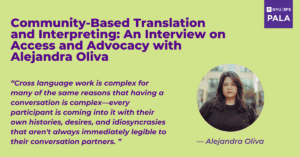Alejandra Oliva teaches the NYU SPS PALA course Community-Based Translation and Interpreting: Access and Advocacy, which begins on September 13. Oliva is a writer and translator who focuses on language justice, trauma-informed translation, and multilingual advocacy. We had the opportunity to speak with Oliva about what inspires her to pursue this work, and what students can expect from taking her course.
What can students expect from the Community-Based Translation and Interpreting course?
AO: I hope students will be able to learn and think more deeply about their own translation practices, and those of their organizations. My ultimate goal is to get people thinking about language justice, and what it might look like to apply it to their own routines and practices, while also setting themselves and their clients up for success with policies and boundaries that make their practice sustainable. I’d also love to think about the ways that translation, and language justice, can be a form of advocacy for communities.
How would you define “language justice”?
AO: I would define language justice as a framework and a way of collaborating and meeting with others that does not prioritize one language over another, that not just allows but encourages people to participate, regardless of their language. A lot of my thinking and reading around language justice is really shaped by the work of this collective, AntenaAire, that has done some really wonderful thinking about translation as a necessary component of language justice, and making multilingual spaces.
Why is cross-language work complex? What should translators keep in mind?
AO: Cross language work is complex for many of the same reasons that having a conversation is complex—every participant is coming into it with their own histories, desires, and idiosyncrasies that aren’t always immediately legible to their conversation partners. This is, I think, magnified by working across languages, which often signifies working across cultures where you have to work a little harder to establish common meanings. As a translator, it’s important to keep those histories and desires in mind–not just for your clients, but for yourself as well. Especially as a translator working with or around our own communities, and also in translating in spaces that can hold a lot of trauma, whether they’re doctors’ offices or an immigration attorneys’ office, it’s really important to have a trauma-informed approach both for yourself and your clients!
Why is community-based translation important to you? What inspires you to do this work?
AO: Community based translation is important to me because it was, for me, a way to get involved in a broader community than one I had been in day-to-day, and use something that felt very intrinsic to my family—speaking Spanish—to talk to other people and help them access information and resources that otherwise would have been more difficult to get. I started doing community-based translation at a pro-se asylum clinic through New Sanctuary Coalition that often met in one of NYU’s buildings, so it’s really nice to be teaching the class here!
What do you expect to find most rewarding about teaching this course?
AO: Meeting and working with students! I assume most of the students in the class will be translators, or people working closely with them, and I haven’t yet met someone in that field who isn’t really interested and devoted to thinking really deeply about justice and language. I’m really looking forward to hearing and thinking about the challenges students have faced as practicing translators and working together as a group to think about ways to sustainably bring language justice to their organizations and communities.
Alejandra Oliva’s course, Community-Based Translation and Interpreting: Access and Advocacy, begins September 13. Register for your spot here.
